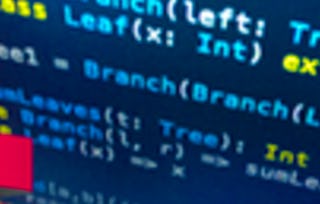Functional programming is becoming increasingly widespread in industry. This trend is driven by the adoption of Scala as the main programming language for many applications. Scala fuses functional and object-oriented programming in a practical package. It interoperates seamlessly with both Java and Javascript. Scala is the implementation language of many important frameworks, including Apache Spark, Kafka, and Akka. It provides the core infrastructure for sites such as Twitter, Netflix, Zalando, and also Coursera.

Functional Programming Principles in Scala
Seize the savings! Get 40% off 3 months of Coursera Plus and full access to thousands of courses.

Functional Programming Principles in Scala
This course is part of Functional Programming in Scala Specialization

Instructor: Martin Odersky
220,350 already enrolled
Included with
8,269 reviews
Recommended experience
What you'll learn
Understand the principles of functional programming
Write purely functional programs, using recursion, pattern matching, and higher-order functions
Design immutable data structures
Combine functional programming with objects and classes
Skills you'll gain
Tools you'll learn
Details to know

Add to your LinkedIn profile
31 assignments
See how employees at top companies are mastering in-demand skills

Build your subject-matter expertise
- Learn new concepts from industry experts
- Gain a foundational understanding of a subject or tool
- Develop job-relevant skills with hands-on projects
- Earn a shareable career certificate

There are 6 modules in this course
Earn a career certificate
Add this credential to your LinkedIn profile, resume, or CV. Share it on social media and in your performance review.
Instructor

Offered by
Explore more from Software Development
 Status: Preview
Status: PreviewÉcole Polytechnique Fédérale de Lausanne
 Status: Free Trial
Status: Free TrialÉcole Polytechnique Fédérale de Lausanne
 Status: Preview
Status: PreviewÉcole Polytechnique Fédérale de Lausanne
 Status: Free Trial
Status: Free TrialÉcole Polytechnique Fédérale de Lausanne
Why people choose Coursera for their career

Felipe M.

Jennifer J.

Larry W.

Chaitanya A.
Learner reviews
- 5 stars
83.54%
- 4 stars
13.51%
- 3 stars
1.70%
- 2 stars
0.66%
- 1 star
0.56%
Showing 3 of 8269
Reviewed on Jun 4, 2019
It was a good introduction to Scala for me. The video are precise and concise. The assignment are made for you to apply the concepts seen in the videos, but they remain challenging and fun to do!
Reviewed on Jan 14, 2017
Content and the lecturing is super. All the assignments makes you think about the subjects. If you want to learn about functional programming and something about scala this is the course for you.
Reviewed on Jul 12, 2016
The course is very good and labs are sometimes difficult but useful. However some material was not covered, and it is always like that, but still it can include iterators and some other chapters

Open new doors with Coursera Plus
Unlimited access to 10,000+ world-class courses, hands-on projects, and job-ready certificate programs - all included in your subscription
Advance your career with an online degree
Earn a degree from world-class universities - 100% online
Join over 3,400 global companies that choose Coursera for Business
Upskill your employees to excel in the digital economy

